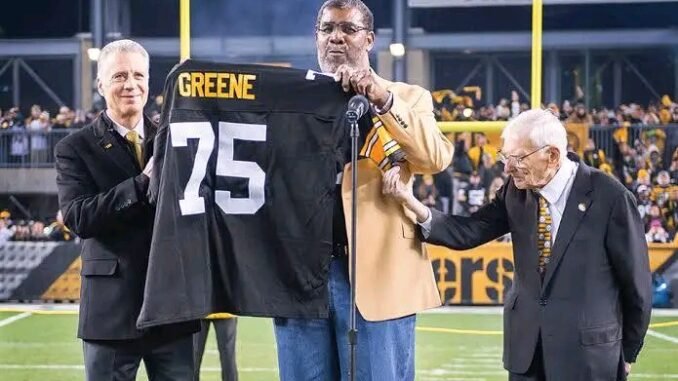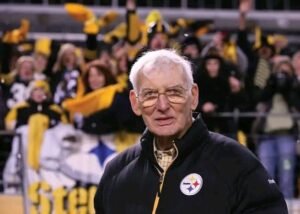
Art Rooney II Boycotts NFL Pride Night: A Controversial Stand from the Steelers’ Patriarch
In a move that has sent shockwaves through the NFL community and beyond, Art Rooney II, the president and principal owner of the Pittsburgh Steelers, has publicly announced his decision to boycott the league’s upcoming Pride Night celebrations. Known as the spiritual anchor of one of the NFL’s most storied franchises, Rooney’s stance has triggered a flurry of responses ranging from fierce criticism to vocal support.
A Symbolic Statement
Rooney, whose family has owned the Steelers since the team’s founding in 1933, is one of the most respected figures in professional football. His measured leadership, deep roots in the game, and commitment to tradition have long made him a revered figure not only in Pittsburgh but across the league. But this latest decision has cast a different light on that legacy.
In a brief but pointed statement released through the Steelers’ front office, Rooney said:
“While I respect the league’s right to promote inclusivity, I personally choose not to participate in Pride Night. This is not a reflection of hate or exclusion, but of my values and my belief in keeping football focused on football.”
Rooney did not attend the team’s scheduled Pride Night events or participate in any of the league-wide awareness initiatives, such as rainbow-themed sideline gear or social media campaigns. His absence, though not entirely surprising given his historically conservative leanings, has brought renewed attention to the intersection of sports, identity, and values.
League-Wide Reaction
The NFL’s Pride Night initiative is part of its broader “Football Is for Everyone” campaign, designed to promote inclusion and support for the LGBTQ+ community. Over the past few years, the league has stepped up its efforts to reflect changing societal values, including more overt displays of support for minority groups and social causes.
Commissioner Roger Goodell responded to Rooney’s boycott with a tempered tone:
“The NFL supports every team’s right to express their culture and values in ways that resonate with their communities. While we encourage unity, we respect individual perspectives.”
Several owners, including Mark Davis of the Raiders and Jeffrey Lurie of the Eagles, voiced strong support for the Pride Night initiative and made appearances at their respective events. Meanwhile, other team owners remained diplomatically silent, unwilling to wade into controversy.
Fans and Players Speak Out
Reaction among Steelers fans has been deeply divided. Social media has lit up with competing hashtags like #StandWithRooney and #SteelersForAll. Some longtime fans have defended Rooney’s decision as an expression of personal conviction. Others see it as a regressive stance that flies in the face of progress and inclusivity.
Steelers linebacker Alex Highsmith shared his thoughts after the team’s optional Pride Night charity auction:
“As a team, we support each other. We may not all see eye to eye on every issue, but I think our locker room reflects the strength that comes from diversity.”
In contrast, veteran defensive lineman Cameron Heyward offered a more assertive take:
“Pittsburgh has always stood for resilience and inclusion. While I respect Mr. Rooney’s leadership, I also believe that football should be a place where everyone feels welcome.”
Historical Context and Legacy
The Rooney family legacy is inextricably linked to the NFL. Art Rooney II’s grandfather, Art Rooney Sr., founded the team and was known for his generosity and loyalty. His father, Dan Rooney, was a powerful force for social equity in the league, having championed the Rooney Rule, which requires teams to interview diverse candidates for head coaching and senior football operations roles.
Given that legacy, critics argue that Art Rooney II’s stance risks tarnishing the inclusive values the family has long been associated with. Some civil rights advocates have called it “a disheartening departure” from Dan Rooney’s vision of equality in football.
The Broader Cultural Divide
Rooney’s decision also mirrors a broader societal debate over the role of sports in promoting social causes. While many teams have embraced initiatives supporting racial justice, LGBTQ+ rights, and gender equality, others have faced backlash from fans who prefer to keep politics out of the game.
In recent years, the NFL has walked a tightrope, trying to honor the game’s increasingly diverse fan base while not alienating traditional supporters. Rooney’s boycott has rekindled this tension, raising questions about where the league draws its lines and how it reconciles freedom of expression with corporate values.
What Comes Next?
The Steelers organization has yet to issue a full statement clarifying whether the team will continue to participate in Pride initiatives in future seasons. Inside sources suggest that team executives are navigating internal differences quietly, with some worried about the potential fallout for sponsorships and community partnerships.
Meanwhile, the NFL Players Association (NFLPA) has reiterated its commitment to inclusivity and announced plans to meet with players across the league to address concerns and reaffirm support for LGBTQ+ athletes and fans.
Final Thoughts
Art Rooney II’s decision to boycott NFL Pride Night may have been framed as a personal choice rooted in traditional values, but its impact reaches far beyond a single evening’s event. It’s a flashpoint in an ongoing conversation about identity, leadership, and the evolving role of sports in society.
Whether this moment will define Rooney’s legacy or simply represent a controversial chapter within it remains to be seen. One thing is clear: in today’s NFL, the game doesn’t end at the goal line. The cultural conversations are just as pivotal—and just as divisive—as the plays on the field.
Art Rooney II Boycotts NFL Pride Night: A Controversial Stand from the Steelers’ Patriarch
In a move that has sent shockwaves through the NFL community and beyond, Art Rooney II, the president and principal owner of the Pittsburgh Steelers, has publicly announced his decision to boycott the league’s upcoming Pride Night celebrations. Known as the spiritual anchor of one of the NFL’s most storied franchises, Rooney’s stance has triggered a flurry of responses ranging from fierce criticism to vocal support.
A Symbolic Statement
Rooney, whose family has owned the Steelers since the team’s founding in 1933, is one of the most respected figures in professional football. His measured leadership, deep roots in the game, and commitment to tradition have long made him a revered figure not only in Pittsburgh but across the league. But this latest decision has cast a different light on that legacy.
In a brief but pointed statement released through the Steelers’ front office, Rooney said:
“While I respect the league’s right to promote inclusivity, I personally choose not to participate in Pride Night. This is not a reflection of hate or exclusion, but of my values and my belief in keeping football focused on football.”
Rooney did not attend the team’s scheduled Pride Night events or participate in any of the league-wide awareness initiatives, such as rainbow-themed sideline gear or social media campaigns. His absence, though not entirely surprising given his historically conservative leanings, has brought renewed attention to the intersection of sports, identity, and values.

League-Wide Reaction
The NFL’s Pride Night initiative is part of its broader “Football Is for Everyone” campaign, designed to promote inclusion and support for the LGBTQ+ community. Over the past few years, the league has stepped up its efforts to reflect changing societal values, including more overt displays of support for minority groups and social causes.
Commissioner Roger Goodell responded to Rooney’s boycott with a tempered tone:
“The NFL supports every team’s right to express their culture and values in ways that resonate with their communities. While we encourage unity, we respect individual perspectives.”
Several owners, including Mark Davis of the Raiders and Jeffrey Lurie of the Eagles, voiced strong support for the Pride Night initiative and made appearances at their respective events. Meanwhile, other team owners remained diplomatically silent, unwilling to wade into controversy.
Fans and Players Speak Out
Reaction among Steelers fans has been deeply divided. Social media has lit up with competing hashtags like #StandWithRooney and #SteelersForAll. Some longtime fans have defended Rooney’s decision as an expression of personal conviction. Others see it as a regressive stance that flies in the face of progress and inclusivity.
Steelers linebacker Alex Highsmith shared his thoughts after the team’s optional Pride Night charity auction:
“As a team, we support each other. We may not all see eye to eye on every issue, but I think our locker room reflects the strength that comes from diversity.”
In contrast, veteran defensive lineman Cameron Heyward offered a more assertive take:
“Pittsburgh has always stood for resilience and inclusion. While I respect Mr. Rooney’s leadership, I also believe that football should be a place where everyone feels welcome.”
Historical Context and Legacy
The Rooney family legacy is inextricably linked to the NFL. Art Rooney II’s grandfather, Art Rooney Sr., founded the team and was known for his generosity and loyalty. His father, Dan Rooney, was a powerful force for social equity in the league, having championed the Rooney Rule, which requires teams to interview diverse candidates for head coaching and senior football operations roles.
Given that legacy, critics argue that Art Rooney II’s stance risks tarnishing the inclusive values the family has long been associated with. Some civil rights advocates have called it “a disheartening departure” from Dan Rooney’s vision of equality in football.
The Broader Cultural Divide
Rooney’s decision also mirrors a broader societal debate over the role of sports in promoting social causes. While many teams have embraced initiatives supporting racial justice, LGBTQ+ rights, and gender equality, others have faced backlash from fans who prefer to keep politics out of the game.
In recent years, the NFL has walked a tightrope, trying to honor the game’s increasingly diverse fan base while not alienating traditional supporters. Rooney’s boycott has rekindled this tension, raising questions about where the league draws its lines and how it reconciles freedom of expression with corporate values.
What Comes Next?
The Steelers organization has yet to issue a full statement clarifying whether the team will continue to participate in Pride initiatives in future seasons. Inside sources suggest that team executives are navigating internal differences quietly, with some worried about the potential fallout for sponsorships and community partnerships.
Meanwhile, the NFL Players Association (NFLPA) has reiterated its commitment to inclusivity and announced plans to meet with players across the league to address concerns and reaffirm support for LGBTQ+ athletes and fans.
Final Thoughts
Art Rooney II’s decision to boycott NFL Pride Night may have been framed as a personal choice rooted in traditional values, but its impact reaches far beyond a single evening’s event. It’s a flashpoint in an ongoing conversation about identity, leadership, and the evolving role of sports in society.
Whether this moment will define Rooney’s legacy or simply represent a controversial chapter within it remains to be seen. One thing is clear: in today’s NFL, the game doesn’t end at the goal line. The cultural conversations are just as pivotal—and just as divisive—as the plays on the field.
Leave a Reply